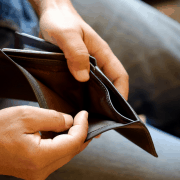Complete Guide to Saving Money (and making a little more)
Written By: Mr. CBB, the writer and owner of the popular Canadian Finance Blog www.canadianbudgetbinder.com.
Smarter Loans Inc. is not a lender. Smarter.loans is an independent comparison website that provides information on lending and financial companies in Canada. We work hard to give you the information you need to make smarter decisions about a financial company or product that you might be considering. We may receive compensation from companies that we work with for placement of their products or services on our site. While compensation arrangements may affect the order, position or placement of products & companies listed on our website, it does not influence our evaluation of those products. Please do not interpret the order in which products appear on Smarter Loans as an endorsement or recommendation from us. Our website does not feature every loan provider or financial product available in Canada. We try our best to bring you up-to-date, educational information to help you decide the best solution for your individual situation. The information and tools that we provide are free to you and should merely be used as guidance. You should always review the terms, fees, and conditions for any loan or financial product that you are considering.
Written By: Mr. CBB, the writer and owner of the popular Canadian Finance Blog www.canadianbudgetbinder.com.
Among the developed countries of the world, Canadians are especially indebted.
According to the Bank for International Settlements, the household debt to GDP ratio is over 100%. This puts Canada above the US, UK, and most other developed countries when it comes to household debt.
Because of the reality of life in Canada, knowing how to save money is not only empowering, but often necessary. If you want to have a good nest egg set aside, consider these 51 ideas on how to save your money in Canada.

Budgeting therefore is the process of understanding dollars and cents and having a personal financial plan in place to help you pay back debt and stay out of further debt in a timely fashion. This is a responsibility that every Canadian should take when it comes to accountability for their money.
Why budgeting?
You care about your money don’t you? It may not matter to you yet but once you start your budgeting journey you’ll realize just how important every dollar is and how fast those numbers can add up.

For example, your morning coffee at the local shop only costs $1.50 which seems reasonable for a cup of coffee but if you get that coffee every day it’s costing you $547.50 a year.

What could you do with that money instead?
I’m betting you could buy cans of coffee, a coffee machine and all the extras for far less and still have money to put towards your debt or investments. The problem is not everyone views money in this manner until they are knee-deep in debt and even then it’s a stretch. You have to be committed and until you are all you see is that meager $1.50.
Keep in mind that $547 is only coffee. That’s like pulling a hair knowing there are thousands more. Your budget incorporates all things related to your life that cost you cash and I can bet there’s more than just coffee in your life. In this case your budget functions as a revolving door for your money which means when you pluck one hair there’s another waiting in its place. Unless you get a grip on where the money is being spent or plucked from you’ll always be struggling to balance the budget and get ahead with your finances. The choice is yours but since you’ve come this far reading I’m presuming you are interested in the likes of budgeting from A to Z .
I want to show you how easy it is to save money with a few simple changes in your life. Are you ready? Let’s go!
Simple Budget
If you are just starting out with a budget and are not good with online budgeting apps or using excel or word programs I’d opt for a simple budget. A simple budget may be a printable budget that you can 3-hole punch and insert into a budget binder. The idea is to pencil and erase your way through your monthly expenses and earnings.
Budget Envelope System
You may have heard of the budgeting jar system or the budget envelope system where you work with cash only and a paper budget. These systems allow you to know where your money is going and how much you have to spend based on what’s left in the jars or envelopes. This also helps to cut down on sporadic purchases since you don’t have the extra cash to play with.
Excel Budget
Many times I’ve called this type of budgeting the baby steps of budgeting systems because once you learn the basics you’ll want to graduate into something more elite such as an excel budget or a mobile app. Personally, I’m a fan of the excel budget and have been for many years now and it has successfully worked for us. Our budget is a zero-based budget where all of the money we earn has a home. This means at the end of the month we should have a zero balance of money because it has all been accounted for.
I know this is a tough topic for those of you who want to save money but in my opinion it has to be done. If you don’t know where your money is at all times you’ve lost sight of your goals.
Besides, tracking your expenses with-in a budget is not hard at all especially if you set aside time each week to focus on your budget to input the data it needs to run. It’s like putting gas in your car. Let the tank run dry and the car won’t go. This is how your budget works, so put in the time and effort to reap the rewards.
If you want to save in a country like Canada, you need a spending framework for all aspects of your life. You need definitive limits on groceries, transportation, and everything else. This requires discipline but ensures that you won’t lose money without accounting for it. There is a number of mobile apps that will help you set and control spending limits easily.



Number one savings tips for groceries and any other product you buy…KEEP YOUR RECEIPTS!
I can’t stress that loud enough because without a receipt you risk not being able to return a product or getting a price reduction if the item goes on sale with-in 14 days. Some stores offer this deal so be on the look-out for store policies.
Money saved is important. So, how do you save money on groceries in Canada?


This is the process of using either paper flyers or your mobile device app where applicable to get the best price on a product you want to buy. For example, if the Cheerios are on sale at Food Basics for $5 but you live close to Walmart who allows price matching all you have to do is get the same box of Cheerios listed in the Food Basics flyer and show the cashier that sale.
He or She will apply the sale price to the product you purchase which helps you save money by doing all of your shopping in one store instead of travelling from shop to shop. Some consumers may not have other options of travelling from store to store because of transportation issues, health issues or lack of grocery stores in the area.
Stockpiling is a great way to save money when you find a deal on a product that you know you will use often. Part of our grocery budget includes a stockpile budget of $25 each month tailored to accommodate any deals that we can pick up at stockpile prices.
Doing this allowed us to focus on our main grocery budget for every day needs and the stockpile budget for using coupons and pairing that with flyer deals or in-store specials that might not have been advertised. This way we still get the savings without hurting the grocery budget. Having a stockpile budget also holds you accountable and gives you direction because you know you only have a set amount of money to spend.
A great example of this was a time that the GreenWorks products were on sale for 1.99 each but had a buy 3 save $5.00 coupon hanger on each bottle. We were paying under $2 for 3 bottles of product that should have cost us around $18 at regular price with taxes.
It was like a never-ending stockpile of cleaning products that we purchased and lasted us over 5 years. In fact, we still have some we are using today in our stockroom.
Shopping in bulk can save you money only if you need the product and will use it before it expires and you’ve compared the price in bulk to sales at your local grocery stores. Consider the cost of buying a 5L jar of Bick’s Pickles for $4.99 at Costco to 1L at Zehrs for $4.99 regular price or $2.99 when it goes on sale. You might even have a coupon to bring the price down lower but you won’t know that until the time comes you are making a purchase. It might be ideal to buy the 5L jar if you love to eat pickles. Besides, pickles last a long time so you wouldn’t have to rush to eat them fast.
Although buying larger quantities of products that are on sale or at your local bulk food store always do the math involved and consider the financial consequences if you don’t end up using the product. Remember a few dollars here and there all adds up over the course of your life-time.
Don’t ever leave a grocery store empty-handed when there is a sale and they are sold out. Always make your way to customer service and at least ask if they will offer you a rain cheque. If the store does offer rain cheques they typically allow you to get up to 4 of the item on sale the next time you shop and they are in stock. Huge money savings right there.
Making a list is without a doubt a great way to save money no matter if you shop at a grocery store or your nearest hardware store. The purpose of the list is to allow you in to detail what you need before you enter a store that is full of marketing ploys the minute you walk in the door from displays to smells. All of these distractions can cost consumers money so go armed with a list.
A weekly or even monthly meal plan direction can relieve stress and save money because you aren’t scrambling to find the ingredients you need at the last minute. Keep in mind meal planning also allows you to shop the weekly deals at your local grocery store to help save you money. For example, if the beef is on sale you buy 2 packages one for a pot of chilli and the other for a pot of Bolognese meat sauce. These two meals that you plan may feed your family for lunch and dinner for a few days during a 7 day period. Although meal planning is a way to save money keep in mind planning around what you already have in your pantry is another level of savings instead of buying more to add to your stockpile.
If you have never heard of SCOP in Canada get ready for some money saving while helping a company realize their pricing errors. SCOP in a nutshell is when you find an advertised product for one price but are charged more for it when cashing out. Not all stores offer SCOP so it’s important to understand it’s NOT a law in Canada. If you find that a product rung up for more than the tagged or sale price then you should point that out and ask for SCOP to be applied. If approved you will get your product free up to $10. If the item is over $10 you will get $10 max.
Canadian winters are really cold. Seeing as we all know that, it’s our responsibility to take steps to reduce our heating expenses. Instead of burning more gas, insulate your windows, get warm blankets, sleep in hoodies, and take other steps to cut your spending.
On the same note, an out-of-order thermostat is something the average Canadian family shouldn’t be wasting money on. Perhaps your thermostat is broken and doesn’t heat your home as much as it suggests it does. In other cases, your thermostat will heat your house too much.
In either case, it’s best to have a functional thermostat so you can remain in control of your spending.
Canadians pay ridiculous prices for internet access, by global standards. Your internet plan is an area where you are financially obliged to try harder to save.
Unfortunately, while cable is becoming less important for Canadians, the lack of choices is still apparent. This is why you must learn how to negotiate with your internet provider. Threatening to switch to another provider may sound sneaky or like a gamble, but it’s really not. The value of long-term customers in the internet business is often enough to give you the room to negotiate. The worst-case scenario is that you switch providers and reap the rewards of customer sign-up bonuses.
If you want to save money, you don’t have the luxury of being able to just forget to turn the lights off. Save on your electricity bills by refusing to allow any unused lights to be left on.
Canadian handy workers charge a small fortune. While we cannot responsibly suggest that you do your own electrical work or other dangerous home maintenance, there are plenty of handy skills you can learn on your own. Try saving by doing your own handy work whenever possible.
Fixing things yourself is great, but even fixing things yourself may be unnecessary. If it’s not worth the time and money, and it works fine, don’t waste time or money on it.
If there’s one lesson I learned about home decor since buying our first home is that we didn’t need half the stuff we’ve bought over the years. Although, I often suggest searching for second-hand and vintage consider keeping your space at home tidy by limiting how much you buy.
When your space is cluttered even with furniture it can seem smaller and it’s also harder to keep clean because you have to move furniture weekly. I also found that the more stuff we had the more dust we’d accumulate. It’s ok to say no to free stuff or to donate regularly to those in need.
Less is always more.

Gas isn’t cheap in Canada. If you want to save money in the long-term, make fuel efficiency an important metric in your decision when you’re shopping for a new vehicle. Fuel efficiency isn’t the most immediately apparent quality in a new vehicle, but the cost of gas will add up over the years.
Insuring a car or any other motor vehicle is infamously expensive in many parts of Canada. If you’re living in Ontario, you know what we’re talking about.
While switching insurance providers isn’t a great idea, choosing your insurer carefully when you purchase a vehicle is. Take advantage of the discounts offered by driving schools. Take your time and make sure you compare rates before signing up for an insurance plan.
Carpooling is another great way to save. If your coworkers anywhere nearby, see if you can come to an arrangement.
Following the strict rules of Canadian roads isn’t only good for safety. Getting fined in Canada can become very expensive very fast. Instead of paying hundreds of dollars for speeding tickets and subsequent insurance premium hikes, just take it easy and save yourself the headache.
What’s even cheaper than a second-hand but fuel-efficient vehicle? Public transportation! If you can make it to work or wherever you need to go by public transportation, do it.
Eating and drinking out costs a lot in most parts of Canada. With few exceptions, eating in costs less than eating out. When it comes to alcohol, you are invariably spending more money when you drink out.
Instead of going to the restaurant, learn to cook a nice meal and invite your friends over. If you drink, skip the bar in favour of the Beer Store or LCBO. Having fun at home can be just as fun as going out with some effort.
Canadian public libraries are treasure troves of knowledge. Take advantage of what they have to offer. Books and videos are both readily available in cities like Toronto, and if you check the library’s directory, you can often get these items shipped to your local branch free of charge.
Social media can be a massive waste of time. Instead of looking at cute kittens, make finance a key component of your Facebook feed. All major social media networks have channels dedicated to financial advice and useful money-saving tips.
The modern economy is full of services that charge you recurring, automatic payments. These are pre-authorized payments that charge you at a specific time every month. Try to:
On the note of passive spending, be frugal with gym memberships. Also, be careful!
Many Canadians don’t even know when their gym contract ends and end up quite frustrated when they realize that they are still being charged months after they thought the membership ended. Unfortunately, this is a nation-wide problem. Pay closer attention to gym memberships than you do other recurring expenses.
Also, try to shop around for cheaper gyms. The largest chain gyms aren’t always the best ones. If you can find a cheaper gym that meets all your needs, get a membership there instead.
Buying the cheapest available option isn’t always the most economical choice. What’s the point of buying cheap if whatever you buy just breaks down in a month?
That may be an exaggeration, but you should always consider the long-term costs when buying a new product. This is especially true of household appliances. Be frugal, but measure the longevity of a new purchase before making your decision. Get on Reddit and look for the real opinions of other consumers.
Brand loyalty can be great, but only once you’ve found the right brand. Many Canadians are giving up on brand loyalty for financial reasons. If you haven’t already, you should join them.
If a new brand comes to your attention, make note of costs and quality. Always be on the lookout for a better deal for any product.
Listen to Macklemore and get down to the thrift shop. Buying new, brand-name apparel is unnecessary. If you’re hurting for money at all, it’s not wise to overspend on clothes when less expensive options are available. You might even have fun and find far superior deals at the thrift shop!
I’m a big believer in recycling, reuse and re-purpose whenever possible which means buying second-hand will always be my first place to shop especially for clothing. Always match what you plan to buy so you can mix and match outfits and don’t buy more clothing that you need. Whether you shop second-hand or not buying too much means your closet and dresser will be bulging full of clothes and accessories you probably will only wear once or twice, if ever. Keep an eye out for online savings from clothing retailers in Canada as well sign up for your favourite stores online who often send out discount codes to their VIP customers.
Why pay to have your clothes fixed by someone else when you can fix them yourself? If you have access to the internet, you can learn to sew from the comfort of your own home.
Go to the Dollar Store and pick up a sewing kit. It costs very little and the skill of sewing will save you a lot of money in the long term.
Even the cheapest barbers and hairdressers cost a lot in Canada. It might be better to just learn how to deal with your own hair. If short hair looks good on you, using a 2-razor on your head is easy.
For men, beard grooming is an expense you can also go without and learning personal beard grooming is far easier than learning how to cut your own hair.
Streaming services are great, but they can be quite addictive! The money you spend on them adds up, as well.
There are many ways to consume the content you want without paying for a monthly subscription. Try checking Reddit, YouTube, and DailyMotion before considering a Netflix or Disney+ subscription.
Of all the habits that will drain you of extra savings in Canada, smoking must be the worst. Tobacco products are heavily taxed in Canada and you’re paying more in taxes than you’re spending on tobacco. Furthermore, Health Canada recommends even more tax hikes on tobacco products every few years.
Stop paying the government to slowly kill you. You’ll live longer and have more money in your wallet.
Saving your coins, even if only $0.50 per day, adds up. Make using coin jars into a fun game by using them to punish yourself for any behaviours you want to drop.
Ideally trying not to create debt you can’t pay back in full or in a reasonable time besides a traditional mortgage or school loans is ideal. The more debt you create the harder it gets to spread your money which leads most Canadians into big trouble. If you really want to smash your debt work on reducing it by finding a second-job, work extra hours or create a business where you can work from home.
There are many types of debts that Canadians endure in their life some which help enrich our lives to help us work towards employment success and others to build wealth such as a mortgage.
One thing always to remember is that debt is debt but the worst debt is consumer debt or any debt you can’t pay back in full such as a credit card or personal loans.
Debt-Fighting Method: Debt Avalanche
The debt avalanche is mathematically superior to the debt snowball when it comes to shaking off your debt. The method specifically targets your debts from the highest interest rates to the lowest. That way, you save a lot of money in interest while removing debt from your life.
Debt-Fighting Method: Debt Snowball Method
The debt snowball is not a mathematically sound method for shaking off debt. It is, however, a psychologically appealing one for many people suffering from debt.
The debt snowball will see you pay off your debts from smallest to largest. You will ignore interest rates on individual debts. While this will cost you more money than the debt avalanche, the snowball will provide you with the psychological reinforcement that comes with removing individual debts from your life, one by one.
Do everything in your power to avoid falling into an endless cycle of credit card debt. It’s never great to have to ask for help from friends and family. Still, getting their support is better than paying 20% interest or more for missed credit card payments.
Credit card debt is a trap. Missing a credit card payment carries heavy immediate penalties, while also lowering your credit score and reducing your financial freedom. If at all possible, avoid hurting your future finances while paying high interest rates.
This app has everything from all of your weekly flyers to coupons to help you create the ultimate list so you can save money.
If you want the best bang for your buck when it comes to filling your gas tank then Gas Buddy will tell you where to go for the best savings.
Canada’s Loan Directory, Smarter Loans, helps you find out the top options and rates for any kind of loans and financing throughout Canada. This helps save money. Taking out personal or commercial financing for a well planned out investment opportunity can provide a good return and extra profit.
Saving money in Canada is not always the easiest thing to do especially when you are struggling to balance your budget. Aside from slashing what you are already spending your money on you can take saving money a step further by earning more money.
If you find you can’t balance your budget the first option is to eliminate or lower your expenses but for many this may be a struggle. The other option is to get a second job to earn more money. Although you may be spending more time away from home you’re earning more money that can help you pay down debt thus saving you money. This is what I did which helped speed up paying our mortgage off but I was also able to secure full-time employment in my dream job at the same time.

Earning money on the side is a great way to save more money in Canada. Blogging for example is a secondary income for many people who offer their skills and knowledge to consumers online. If you have skills that are in demand then put them to good use by advertising them and watch the extra cash come in.

Ok, we won’t specifically recommend you get on Airbnb. However, if you have extra space in your home, rent it out! Just make sure you aren’t breaking any subletting rules and be careful who you let stay in your home. If you can manage those two concerns, you can make a lot of extra money by accommodating others.

Don’t wait for the raise to come to you, go grab it. Stand up for the skills and profession you work in and ask your boss for a raise. If they say yes you can use the extra cash to pay off debt or stash it away in your savings or retirement account.

There is never a time where I’ve thought that education is a waste of time. Any opportunity you get to upgrade your skills or learn new skills which you can apply to your career will only help you earn more money.

When I moved to Canada I went back to school at the age of 30 to upgrade my skills so I could better my life. This was not in my plans but it was the only way I was going to increase my opportunity in Canada to find a career where I was earning more than minimum wage.
Along the way I was able to network with different business owners in my field, volunteer my time and eventually secure an employment opportunity. That one opportunity helped me to get a second job which ended up being my dream job where I currently work full-time.
It took me 5 years with my foot in the door working two jobs for my permanent employment offer, but I did it. One of the biggest regrets I have with my first job in Canada was not asking for a raise which I strongly encourage. The worst your employer will say is no. Finally, I started what I believed was going to be a little finance blog documenting our financial journey only to learn that there were thousands of Canadians who wanted to follow along.
I never realized the impact your personal experiences could have on the lives of those who need motivation the most. Earning money from blogging was not my intention but it ended up slowing moving in that direction which was a nice little perk to our savings. Ideally if you want to save money in Canada find something that you love to do and bring it to life even if it requires baby steps which most opportunities do.
The saying, “You can’t win the lottery if you don’t play” comes to mind and although I’m not referring you to the lottery booth I’m simply stating that risk is not always going to yield unfavourable results.
The CRA offers many deductions, and you should take them up on their offers. The Climate Action Incentive is a great place to start. However, there are too many potential deductions to cover here. Make sure you do some homework and keep more of your money.
Donating your spare money is good for your soul and can be easy on your bank accounts. The CRA gives millions of Canadians tax incentives for donating.
According to Turbotax, the Charitable Donations Tax Credit can account for up to 29% of what you donate at the federal level.
Anytime you invest your money whether it be in real estate, business opportunities, stocks, retirement savings and life insurance investment plans you run the risk of losing it all. On the flip-side you stand to earn even more money than you may have anticipated and surely more than you would have had the money sitting in a high-interest savings bank account.
This is where you have to ask yourself whether your risk tolerance can handle the ups and downs of the financial market. If the answer is yes then investing your money in any of the above with a financial plan in place may be the route for you. If no, then finding less stressful hiding spots such as a traditional savings account or GIC for your money to help it grow may be a better option.
Almost everyone has a savings account at a brick and mortar bank or online bank where money is deposited and earns interest. Saving money in a bank is a great way to build emergency savings and to have a bit of cushion available without having to worry about releasing funds.
An RRSP was introduced in 1957 and is a savings plan in Canada that gets special treatment by the Canada Tax Revenue Agency. The RRSP is one of the most popular ways that Canadians can save money for retirement.
The RRSP allows us to defer income tax that you would generally pay today to a time in the future. So, when you remove your RRSP you will get taxed then rather than today. In the meantime it allows your RRSP investments to grow tax-free which means more savings.
As Ben Felix, Associate Portfolio Manager at PWL Capital points out in his video “How an RRSP Works” defined benefit plans have mostly disappeared and Canadians are now responsible for saving money to retire on. Many employers in Canada offer an RRSP savings plan to their employees where the employer will match up to a certain percentage if the employee invests x amount.
This is free money so if you can take on the RRSP as a savings plan at work and outside of work you’re well on your way to saving for retirement.
The TFSA was introduced in 2009 and has increased in popularity ever since. Unlike an RRSP, you do not get a tax refund when you contribute to a TFSA. You also do not need to pay taxes as it’s a tax-free account as the name suggests. That means you can invest your money with-in a TFSA and when it grows so does your pocket-book.
Should you invest in a Tax Free Savings Account?
Well, the choice is yours but if you have the extra money I’d say, yes! The Tax Free Savings Account can be used as Emergency Savings or even Retirement Savings. As of 2019 you can contribute $6000 a year to your TFSA as the government sets limits as to how much can be invested yearly and has varied since 2009.
Dividends are cash payments made to shareholders in a company which means you invest your money in a company and when they earn, you earn too. By investing in a company you become part-owner of that company so any recognized profits become in part, cash in your pocket.
Over at the popular blog My Own Advisor, founder Mark states the 5 Things You Need To Know About Dividend Paying Stocks:
Some of the most lucrative rewards programs in Canada are already in your wallet or on your computer and smartphone. There are a myriad of rewards programs in Canada that help Canadians save money and even better, earn points towards products or cash back. Take the time to explore all of your options and pick what works for you because leaving free money on the table is not smart saving.
We earn and save with all of the below programs including credit cards rewards.









Mr. CBB is the writer and owner of the popular Canadian Finance Blog www.canadianbudgetbinder.com He blogs about all things relating to finance in Canada while sharing his families journey to Debt Freedom using a budget.